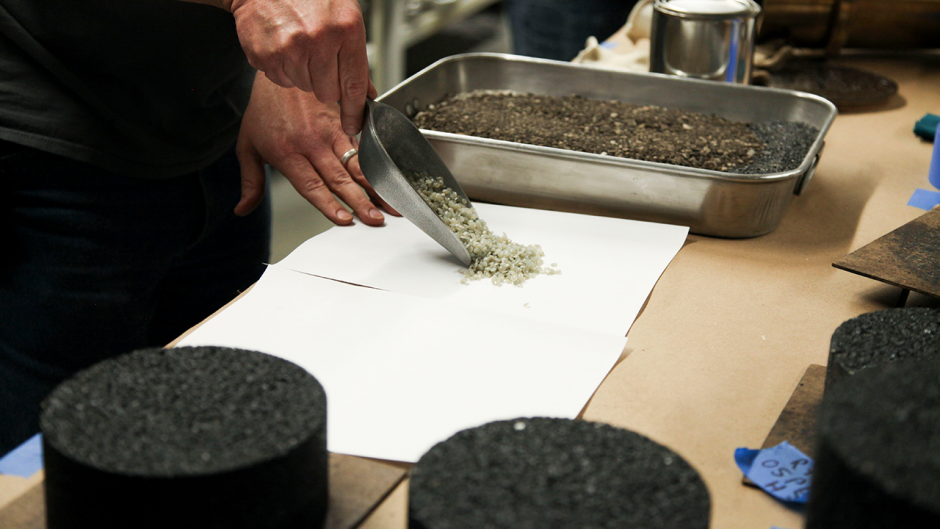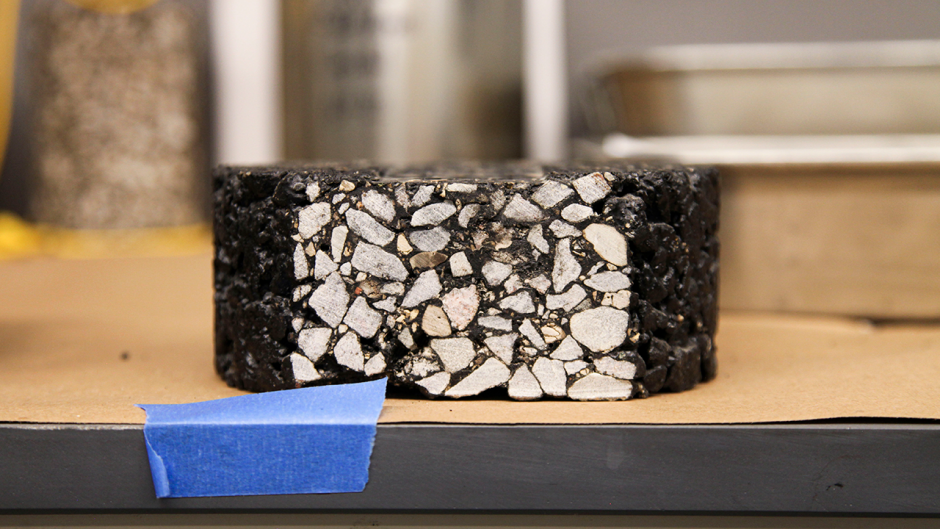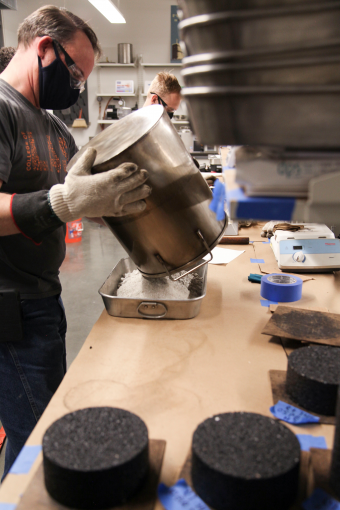Each year in the United States, millions of tons of plastic waste are discarded and not recycled, leading to serious environmental problems. In an effort to help keep this waste from ending up in the environment, engineers at the University of Missouri are partnering with Dow and the Missouri Department of Transportation (MoDOT) to test mixing plastic waste into the asphalt pavement mixtures for possible use on American roadways and bridges.
Asphalt pavement mixtures are typically created from a mixture of asphalt and other materials called "aggregates," such as stone, sand or gravel, said Bill Buttlar, the Glen Barton Chair in Flexible Pavements in the Department of Civil and Environmental Engineering. He said the chemical makeup of plastic helps it become a good product for road pavement mixtures.
"Plastic was developed to be durable and has a shelf life of hundreds of years," Buttlar said. "Asphalt and plastics are also chemically similar because they both come from crude oil, so they can be mixed together. They aren't perfectly compatible, but it's close enough that engineers and chemists can work together to find a workable solution."

Lab staff in the Mizzou Asphalt Pavement and Innovation Lab, or MAPIL, show the plastic waste particles that are being added to the pavement mixture. The lab is located inside the MU College of Engineering.
Inside the Mizzou Asphalt Pavement and Innovation Lab, or MAPIL, located in the MU College of Engineering, engineers and students are determining how to incorporate various types of single-use, polyethylene-based plastic waste into asphalt pavement, including drinking bottles, grocery bags and drinking straws. Buttlar, the lab's director, said the idea for using plastic waste in pavement developed through a series of conversations he had with Mizzou alumnus Jim Fitterling, the chairman and CEO of Dow, a $39 billion global materials science company, following a tour Fitterling had of the MAPIL lab during a recent visit to the college.
Fitterling is looking forward to partnering with his alma mater.
"I joined Dow more than 35 years ago, two weeks after graduating from Mizzou," Fitterling said. "Both this company and this university have been integral parts of my life. So, I always appreciate the opportunity to bring the two together. But, even more than that, through this project, Mizzou and Dow are partnering on an innovative solution that will better our planet. This project fits perfectly at the intersection between both Dow and the University of Missouri's purpose and mission. At Dow, we're working to tackle some of the toughest challenges facing our world, like ending plastic waste. These challenges will require great problem solvers and strong partnerships. I know we're getting both when we work with the University of Missouri College of Engineering."
A real-world test
MoDOT is excited to begin seeing the use of recycled plastic in asphalt pavements, said Dave Ahlvers, state construction and materials engineer.
"Recycled material is an important element of delivering a durable and economic product," Ahlvers said. "We currently utilize recycled asphalt, pavement, recycled asphalt shingles and ground tire rubber in our mixtures. Expanding to utilize plastic reduces the amount of virgin material needed, which is a winning situation for the environment and overall cost."
MU's engineers and students get to test their laboratory-developed mixture in a real-world environment when it is applied as a pavement overlay, or a new layer of asphalt, to a deteriorating section of road surface, along a stretch of Stadium Boulevard in Columbia from College Ave. to U.S. Highway 63 where traffic averages approximately 36,000 vehicles a day. Buttlar said to confirm the results, the team will need to observe the nearly two-mile test area for at least one year, including one summer and one winter season. He said a pavement overlay should last for at least a decade, or about 12-15 years, before needing to be replaced, and recycled materials such as plastic and tire rubber can also extend pavement life by increasing both its strength and toughness. Buttlar also plans to conduct long-term monitoring of Stadium Boulevard and future demonstration projects in partnership with MoDOT.
The test sections on Stadium Boulevard will also include a control section, or area with a current pavement mixture commonly used and approved by MoDOT, as well as an additional test section using a pavement mixture including a chemically modified, recycled ground scrap tire rubber. The ground tire rubber test is being conducted in collaboration with an additional project partner, Asphalt Plus, LLC. This product extends road life, reduces road construction costs, and could prevent the disposal of millions of scrap tires in the U.S. and Europe.
Meeting the right specifications
Before a pavement mixture can be applied on a commercial scale to be used by contractors when bidding on road projects, it must first have a certain specification that is approved by MoDOT, or another state's transportation regulatory authority. This process begins in the development stage, when labs such as MAPIL assist with creating a product, and can also continue once a field demonstration project has been completed and contractors can conduct further innovation in their own laboratories.
"The specifications are a set of requirements and parameters that are placed in the contract so that a consistent product can be produced and bid on by all contractors," Ahlvers said. "Innovation allows MoDOT to use our funding most efficiently, and we are hopeful that we can make a difference in reducing plastics entering landfills."
Keeping the environment in mind
One key aspect of this project is making sure the final product doesn't cause a harmful impact to the environment. So Buttlar is collaborating with one of his colleagues in the College of Engineering, Baolin Deng, to study the project's environmental impact. Deng, a professor in the Department of Civil and Environmental Engineering, has already assisted Buttlar's team with electron microscopy testing and water quality testing, and Buttlar said so far, the results indicate that the environmental impact should be negligible.

An asphalt pavement test mixture sample designed by the Mizzou Asphalt Pavement and Innovation Lab is ready for further lab testing to determine its strength and durability.
"Everyone has a sense that this is a really big deal," Buttlar said. "On the one hand, we appreciate plastics and we benefit from them, yet we are swimming in plastic waste right now. This is clearly a critical, global challenge where there are not a lot of viable solutions currently available. In this case, the pavement will have to be durable, economical and truly sustainable. We're now focused on studying the life cycle of plastic waste in pavement to make sure that it is a cleaner, more sustainable approach, and I think everyone senses that this is a possible solution."







